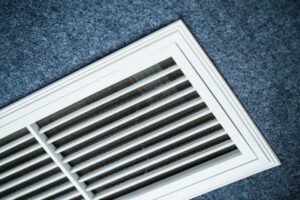“How can I pay less to cool and heat my house?” You’ve probably asked yourself this before, and you can find many options to lower how much you need to depend on running your heating and air conditioning system over the year.
One method you might try is to close vent covers in unoccupied rooms. This seems to make sense: blocking the flow of conditioned air to empty rooms means less energy used.
Except … this is completely false! Closing room vents (or blocking them) won’t save money on heating and cooling. It does the opposite: it costs money in energy efficiency, repairs, and failed equipment! We’ll take a look at why closing rooms vents is a destructive move for your HVAC system.
First, the reason closing vents doesn’t save energy
When you block a vent, you may prevent most of the conditioned air in the ductwork from entering the space, but the HVAC system won’t use less energy. The AC/heater still expends power to condition the air. When you shut a room vent, you aren’t signaling to the HVAC system to cut down how much it cools or heats; it still uses the same amount of power.
Moving on to why closing the vents will backfire and make trouble for the HVAC system…
Ductwork damage
Leakage in the ducts is a major source of energy waste. Ducts can develop leaks in several ways, but nothing makes holes faster than raising the air pressure in the ventilation system. When you close vents, you cause the ventilation pressure to increase, and soon holes will start popping up along the ductwork. Air duct leaks can account for losing up to 30% of the conditioned air in the ventilation system, air you’ve already paid to heat/cool.
Coil freeze
A frozen evaporator coil is a big problem for an air conditioner. It prevents the coil from absorbing enough heat from the air to provide comfort to the house. Several problems can lead to coil freeze, including shutting rooms vents. When these vents are shut, it restricts airflow through the AC, and when less warm air passes over the evaporator coil, the coil will remain below freezing and turn water moisture to ice along its surface.
More pressure on the blower
The blower pulls air from return vents and then sends it through the air conditioner/heater, and then into the supply ducts to the rooms. When closed vents raise air pressure, it means the blower has to work harder. The blower will run longer and waste power.
Failed HVAC system
The pressure placed against the blower does more than drain power unnecessarily. It jeopardizes the operation of the HVAC system. For example, if the blower motor overheats because of this pressure, it will trip a circuit breaker and shut down the HVAC system. The extra strain on the blower also shortens its life, leading to a need to replace its motor early.
We don’t want you trapped with an AC repair in Live Oak, FL because of closed vents! You have much better options for conserving energy—such as putting in a zone control system that lets you control which rooms receive heating and cooling in a safe and money-saving way.
Call Touchstone Heating and Air Inc 24/7 for exceptional customer service!

